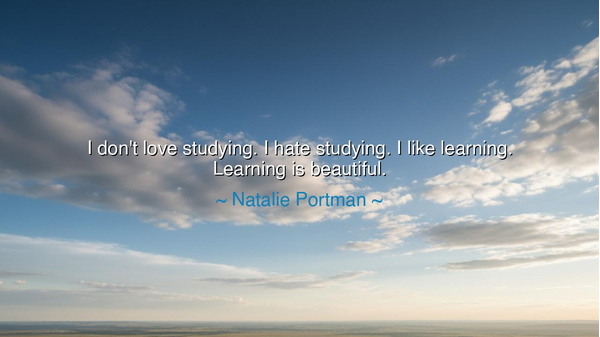
I don't love studying. I hate studying. I like learning. Learning






The gifted scholar and artist Natalie Portman, whose brilliance extends beyond the stage and screen, once confessed: “I don’t love studying. I hate studying. I like learning. Learning is beautiful.” Within this simple and honest declaration lies a profound distinction—one that echoes through the ages. For studying and learning, though often spoken of as one, are not the same. Studying is the labor of the mind; learning is the awakening of the soul. The first demands discipline, repetition, and endurance; the second blossoms from curiosity, wonder, and the desire to know truth. Portman’s words remind us that knowledge is not meant to be a burden—it is meant to be a light, illuminating both the world and ourselves.
To say “I hate studying” is not rebellion against wisdom; it is a rejection of lifeless routine. The act of studying can sometimes become mechanical—pages memorized without meaning, facts recited without feeling. It is the cage that can trap the spirit of discovery when pursued only for approval, achievement, or fear of failure. But to say “I like learning” is to reclaim the heart of knowledge. Learning is the spark of wonder in a child’s eyes, the quiet joy of discovery, the thrill of understanding how one thing connects to another. It is the same flame that guided the ancient philosophers and explorers—the belief that the pursuit of truth is not duty, but delight.
Portman herself, known not only for her artistry but for her scholarly pursuits, understood this truth intimately. Even as she studied at Harvard University, she confessed that her love was not for exams or assignments, but for the awakening that came when an idea suddenly made sense. In that moment—when knowledge transforms from information to insight—she found beauty. Her words echo the eternal truth that wisdom cannot be forced into the mind; it must be invited into the heart. For learning is not merely gathering facts—it is the art of seeing the invisible, of recognizing the patterns of life, of finding meaning within mystery.
The ancients spoke of this difference long before Portman’s time. The philosopher Confucius taught that the wise man delights in learning because it nourishes the soul, not because it brings reward. The Greek sage Plato said that all learning is a form of remembering—the soul awakening to truths it has always known. And Aristotle, his student, believed that wonder is the beginning of wisdom. None of these masters praised the rote discipline of study for its own sake; they spoke of knowledge as a living, breathing joy—something to be felt as much as understood. It is this living joy that Portman calls beautiful, for beauty, like learning, cannot be confined to mere utility.
Consider the story of Leonardo da Vinci, the eternal learner. He studied anatomy, geometry, art, and astronomy—not because he was ordered to, but because he was consumed by curiosity. He drew the flight of birds not for reward, but for wonder. He dissected the human body not for obligation, but for awe at the divine architecture of flesh and bone. His learning was not labor—it was love. Yet even Leonardo, had he been forced to study under compulsion, might have found it bitter. The beauty of learning lies not in the task itself, but in the freedom of discovery—in learning because one must, not by command, but by calling.
When Portman says that learning is beautiful, she reminds us of something modern life often forgets: that education is not about competition or validation, but about transformation. To learn is to grow, to evolve, to become more aware of the vastness of the universe and the depth of one’s own being. True learning humbles us; it breaks the arrogance of knowing and replaces it with gratitude for the unknown. It does not end when school ends—it is a lifelong pilgrimage, an endless unfolding of understanding.
So let this be your lesson: do not chase knowledge as a duty, but as a joy. When you study, do not do it for praise or success; do it to learn, to understand, to see beauty in what you did not before. Read not merely to pass, but to awaken. Ask questions. Wonder at the stars, the trees, the words of the wise, the pulse of your own heart. Seek learning in every encounter, in every failure, in every silence. For studying may train the mind—but learning will set the soul free.
And when you find yourself weary of the grind, remember Natalie Portman’s wisdom: “I don’t love studying. I hate studying. I like learning. Learning is beautiful.” For it is not the burden of knowledge that enlightens us, but the joy of discovery. Learn not to conquer books, but to understand life—and in doing so, you will find that learning, indeed, is the most beautiful act of living.






AAdministratorAdministrator
Welcome, honored guests. Please leave a comment, we will respond soon